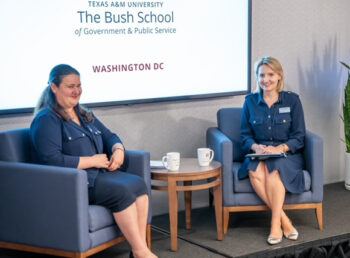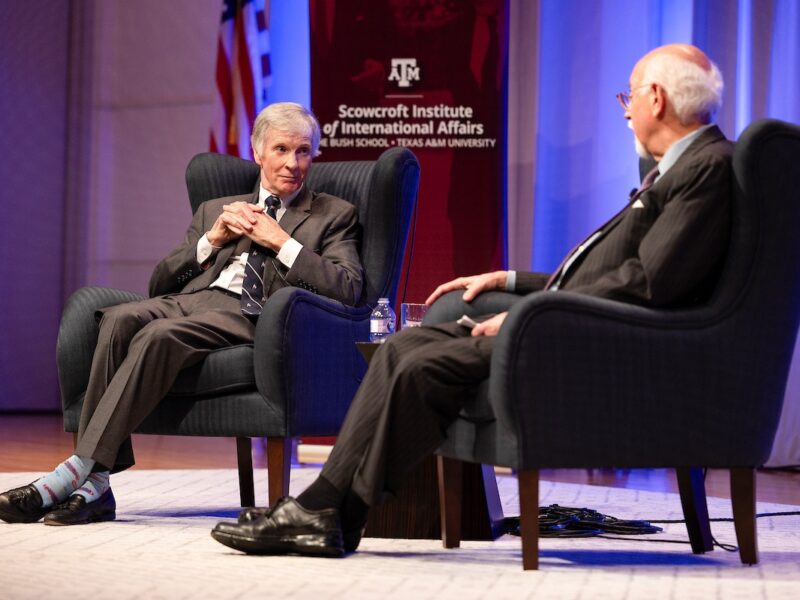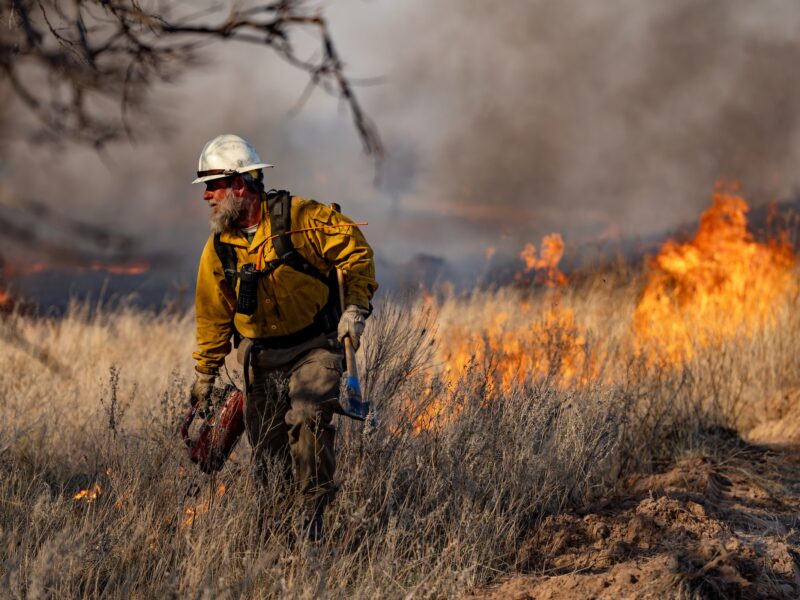Ukrainian Ambassador Says Conflict With Russia Has Implications Across The World

Texas A&M University’s Bush School of Government & Public Service recently welcomed Ukraine’s ambassador to the United States, Oksana Markarova, to its Washington, D.C., teaching site, affectionately known as the Bush School DC.
Executive Director Jay Silveria provided introductory remarks, welcoming several guests, including Gen. (Ret.) Michael Hayden, Gen. (Ret.) William Walker, Gen. Mike Downs, and House Sgt. at Arms Karen Gibson. The full house also included 30 high school students who were visiting the Bush School DC as part of an international leadership program. He noted the ambassador’s visit was made possible through the Bush School’s Diana Davis Spencer Program in National Intelligence and Security.
Ambassador Markarova began her remarks by addressing the high schoolers, telling them to study, learn and ask questions from the VIPs in the room, telling them this is the “intellectual start” in their lives.
She went on to discuss the importance of public service, citing a quote from the Bush School’s namesake, President George H.W. Bush. “Men and women of character can make a difference in their states and in other countries. This is our duty to make a difference.”
She praised Texas A&M for its support of Ukraine through its faculty and students, proudly mentioning that in the fall of 2022, Senior Lecturer Kateryna Shynkaruk became the first faculty member from Ukraine to join the Bush School. Shynkaruk teaches Eastern European politics, European security and international relations.
“What she’s teaching here is a very important subject, which not only wasn’t taught in a number of Western countries, but actually Russia never studied.”
Markarova served as Ukraine’s Minister of Finance for several years before being tapped for the role of ambassador to the United States. As the country’s wartime diplomat for the past 18 months, the ambassador reiterated what she has stated in previous speeches. Markarova thanked the United States for sending weapons and for its ongoing support, but also stressed that more support is needed for Ukraine to win the war against Russia.
“Today we defend our moral space,” Markarova said. “It is not only Ukrainian. Everything has, or is, about this moral basis. Our victory depends on our ability to stand together and to stay mobilized.” Markarova also noted that the conflict is much bigger than just Ukraine. “It’s also about all other countries who have aggressive neighbors — whether it’s in Asia or Africa or Latin America. They are looking and calculating whether they can do it to their neighbors.”
In a question-and-answer session with Shynkaruk, the Ukrainian ambassador noted that one of the biggest takeaways from the Russia-Ukraine war will be what can be learned for future generations.
“We’re not all Russians, and this was a surprise to them for some reason. Eastern European politics and European security is a topic of today. The more we learn from this war, and what led to this war, the better we can restore the international security architecture and return to the time of peace which has been a basis for the prosperity of all our countries.”
Markarova noted that despite the current conflict, Ukraine recently celebrated 32 years of renewed independence. She said the optics of seeing a Ukrainian flag in cities across the war-ravaged country was not insignificant, noting that “every inch of land liberated is a life saved. It (represents) people who are not tortured or killed under occupation.”
In closing, the ambassador said, “the number of atrocities and war crimes that have been committed in this very difficult 568 days now have been beyond any imagination. This should not happen, not only in Ukraine or in Europe in the 21st century, this should not happen anywhere in any part of the world.”
Media contact: Robyn Small, rsmall@tamu.edu





